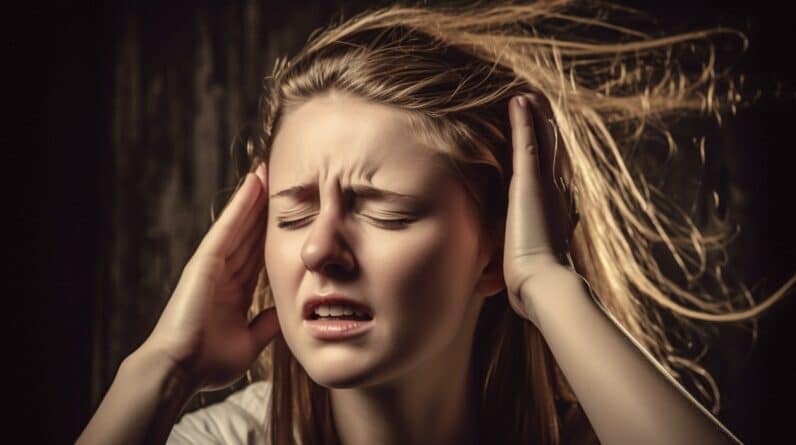
We may earn money or products from the companies mentioned in this post.
As an Amazon Associate I earn from qualifying purchases.
Table Of Contents
If you’ve ever experienced a pulsing, thumping sound in your ears that corresponds to your heartbeat, you might be dealing with a type of tinnitus known as vascular based tinnitus. It is a far cry from a simple ear infection or a case of water in the ear. This form of tinnitus is a perplexing and often aggravating condition that affects a surprising number of people globally. So, what sets vascular-based tinnitus apart from its counterparts? The answer is in the heartbeat.
What is Vascular Based Tinnitus?
Vascular based tinnitus, often referred to as pulsatile tinnitus, is a condition where individuals perceive a sound that usually beats in time with their pulse. This trait makes it different compared to the non-pulsatile tinnitus that often presents as ringing, buzzing, or clicking sound in the ears.
Vascular tinnitus gets its name from the fact that it’s primarily caused by blood flow alterations in the vessels near the ear or irregularities in the vascular structures. And while traditional tinnitus can often be a mystery, vascular based tinnitus often has a discernable source.
Key Features of Vascular-based Tinnitus
Two vital traits set vascular-based tinnitus apart from other types. The first being its pulsatile nature, meaning it syncs with your heartbeat. This rhythm can be diagnosed with the help of an ICD-9 code for vascular tinnitus.
Its second key feature is its association with the blood vessels and vascular conditions. Many cases are often due to a disruption of blood flow, whether from hardening of the arteries, aneurysms, or malformations of capillaries.
Despite being a less common type of tinnitus, understanding vascular based tinnitus can be pivotal in managing the condition and finding relief, whether that means lifestyle changes, medication, or exploring natural remedies such as Ginkgo Biloba or essential oils. Remember, with the right approach, vascular-based tinnitus can be controlled.
For additional information and understanding of the tinnitus, please refer to resources like the American Tinnitus Association for a detailed dive into this perplexing condition.
Causes of Vascular Based Tinnitus
Delving deeper into the causes, vascular-based tinnitus, often known as pulsatile tinnitus, can be triggered by various medical conditions. One such condition is a high-riding jugular bulb, wherein the top part of the jugular vein is situated unusually high in the skull and close to the structures of the middle ear, amplifying normal bodily sounds such as the pulse. This condition can be quite concerning, as the echoing throb in your ear matches the rhythm of your heart. As troubling as this may sound, it’s important to remember that with proper treatment, the symptoms can be improved.
Mastoiditis is another medical condition that often proceeds unnoticed but can sometimes lead to vascular-based tinnitus. This infection of the mastoid bone in the skull can cause inflamed blood vessels that result in the characteristic throbbing or whooshing sound in the ears. But don’t let this get to your head – even mastoiditis can be treated effectively, with various remedies, from antibiotics to essential oils, like helichrysum, for symptom relief.
Symptoms and Diagnosis of Vascular Based Tinnitus
When it comes to symptoms of vascular-based tinnitus, the main sign you’ll notice is a rhythmic sound in your ears that coincides with your heartbeat. This can include a pulsing, humming, or a general whooshing noise that tends to wax and wane with your heart’s rhythm. This kind of tinnitus can sometimes create discomfort, but rest assured, there’s a myriad of potent therapies available, from traditional treatments to alternative medicine options like ginger or garlic, that can help.
Diagnosing vascular-based tinnitus leans heavily on patient history and a physical examination. The diagnosis can be confirmed further through imaging tests, like MRI or CT scans. Pulsatile tinnitus ICD-9 and pulsatile tinnitus MRI are essential tools used in diagnosing this condition. Always remember that every diagnosis is a step closer to finding relief.
–
Pulsatile Tinnitus ICD-9 and Pulsatile Tinnitus MRI
Before we delve into the solutions for this pulsating nuisance, let’s take a closer look at the diagnostic aspect. Medical professionals often use specific tools and codes, like the International Classification of Diseases 9th Revision (ICD-9) and magnetic resonance imaging (MRI), to diagnose conditions like vascular-based tinnitus.
The ICD-9 code for pulsatile tinnitus aids physicians in precise diagnosis, placement of treatment strategies, as well as comprehensive documentation of the medical condition. This alpha-numeric medical diagnostic code, specifically designed for pulsatile tinnitus, ensures that healthcare professionals worldwide speak the same diagnostic language.
Further, an MRI is an additional potent tool used in diagnosing this peculiar version of Tinnitus. By using magnetic fields and radio waves, an MRI creates a detailed image of the internal structures of the head, helping to reveal irregularities in the blood vessels or tumors that could be causing the symptoms. Every test, every image, and every code play a crucial role in reaching the solution.
Treatments for Vascular Based Tinnitus
Getting diagnosed with tinnitus can be difficult, but it’s essential to remember that it’s not a full stop, just a comma. There are various treatments available which are designed in such a way that it makes living with vascular based tinnitus easier, from conventional medical treatments to alternative therapies.
At the frontline of this medical battle are therapies and medications designed to manage symptoms. These may include medications to address possible underlying conditions, such as high blood pressure or atherosclerosis, which could be causing the tinnitus.
In addition to medication, lifestyle modifications can also have a significant effect. These changes might include reducing exposure to loud noises, limiting caffeine and alcohol, and managing stress levels. Many people find relief in alternative therapies such as using CBD-based products, taking certain vitamins and supplements, trying herbal remedies, and much more based on individual requirements.
Don’t forget to consult with your healthcare provider before starting any new treatment. As you navigate through this journey, remember that you’re not alone and there are resources to support you like [Mayo Clinic] . Be patient, be perseverant, and you’re sure to find what helps you silence the traffic of noises in your ears.
–
Home Remedies
Suppose you are looking for more natural remedies to add your arsenal against vascular-based tinnitus. In that case, you’re in luck, because there are several tips and tricks that people have found success with over time. Remember, everyone is different, and what works for one person might not work for another, so explore your options and see what works for you.
-Magnesium is essential in maintaining good health, and it could potentially also have positive effects on tinnitus symptoms. Studies suggest that a lack of this critical mineral might contribute to the development of tinnitus. Therefore, incorporating a diet high in magnesium or supplements might help.
–Ginkgo Biloba is a popular herbal supplement and has been employed in Chinese medicine for centuries. Some suggest it might reduce tinnitus symptoms by increasing blood flow to the ear.
-Essential oils have been used as a remedy for various conditions for hundreds of years. Some have found relief from symptoms using certain oils, such as helichrysum, which may help reduce inflammation and improve circulation.
While these home remedies have been beneficial to some, it’s crucial to remember to consult with a healthcare provider before trying out a new treatment, as individual circumstances and the underlying cause of your tinnitus will determine what will work best.
Conclusion: Living with Vascular Based Tinnitus
Living with vascular-based tinnitus can undoubtedly be challenging. But remember, diagnosis is the first step towards management and relief. Combining lifestyle modifications, medications, and even home remedies can lead to successful symptom management. However, it’s essential to have patience and perseverance, as the road to relief might take some time. Always consult with your healthcare provider before trying out a new treatment, and arm yourself with the right information, such as resources from Mayo Clinic, to ensure you are making the best decisions for your health.
Vascular Based Tinnitus - Frequently Asked Questions (FAQ)
Vascular based tinnitus, also known as pulsatile tinnitus, is a form of tinnitus where individuals perceive a rhythmic noise that usually beats in time with their pulse. The condition primarily arises due to blood flow alterations in vessels near the ear or irregularities within the vascular structures.
Vascular based tinnitus can be caused by various medical conditions that alter blood flow or affect the vascular structures near the ear. Some common causes include a high-riding jugular bulb, mastoiditis infection, atherosclerosis, blood vessel malformations, or tumors in the head or neck region.
Vascular based tinnitus is primarily diagnosed based on patient history and physical examination. The diagnosis can be confirmed further through imaging tests like MRI or CT scans. The ICD-9 code for pulsatile tinnitus is used by physicians for a precise diagnosis and treatment planning.
Suggestions for home remedies often include dietary changes or supplementation, such as increasing magnesium intake, as well as trying herbal remedies. For instance, the use of Ginkgo Biloba is known to promote blood circulation, which might help alleviate symptoms. Additionally, some essential oils, like helichrysum, are also believed to potentially help with symptom management. However, it is important to consult with a healthcare provider before initiating any new treatment.
While there is currently no cure for tinnitus, many treatment options can help manage symptoms and significantly improve the quality of life. Treatments could include medications, lifestyle modifications, sound therapies, and even certain forms of psychological therapy. It is crucial to remember that what works best often varies greatly from person to person, and it may take some trial and error to find the most effective approach.
Amazon and the Amazon logo are trademarks of Amazon.com, Inc, or its affiliates.
No related posts.








